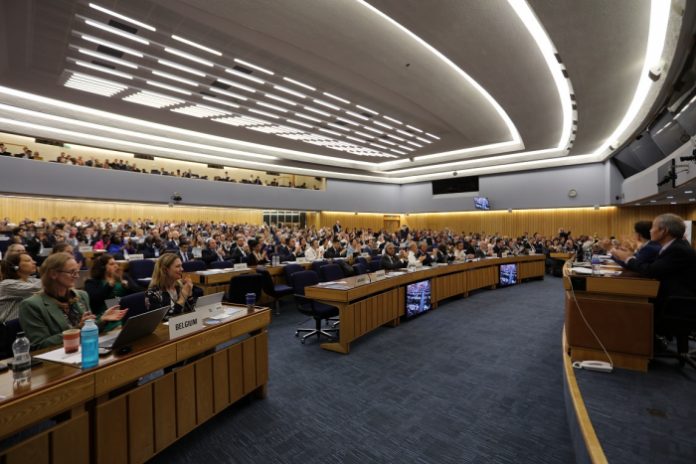The International Maritime Organisation (IMO) has today reached a historic, unanimous agreement among its over 170 member States, to phase out greenhouse gas (GHG) emissions from ships by 2050.
The IMO is the London-based United Nations specialized agency responsible for safe, secure, and efficient shipping and the prevention of pollution from ships. The 2050 commitment is the main target introduced in the 2023 IMO Strategy on the Reduction of GHG Emissions from Ships, which was adopted by the IMO Marine Environment Protection Committee. The said strategy also contains intermediate checkpoints for GHG reductions from international shipping by 2030 (20% – 30% reductions) and 2040 (70% – 80% reductions). Furthermore, it contains carbon intensity reduction targets, as well as a 5%-10% 2030 target for the uptake of zero or near-zero GHG emission fuels and energy sources used by international shipping.
The IMO GHG Strategy represents the continuation of work by IMO, as the global regulator of international shipping, to address GHG emissions from shipping. The 2023 Strategy is a revision of the Initial Strategy on the Reduction of GHG emission from ships that was adopted by the IMO in 2018.
Malta, through officials from the Merchant Shipping Directorate within Transport Malta, is a very active member of the IMO and has participated in the two-week long negotiations at the IMO. The negotiations involved very sensitive discussions that finally led to the adoption of the Strategy by consensus. Malta, as a leading maritime jurisdiction, has supported the groundbreaking adoption of the Strategy.
Minister for Transport, Infrastructure and Capital Projects Aaron Farrugia, as Minister responsible for maritime affairs, welcomed this historic agreement and commented that “the agreement on the revised Strategy represents a major milestone, since it includes concrete commitments that will pave the way for the decarbonisation of international shipping. This will set clear signals to the shipping industry and the energy sector, to provide certainty and be able to secure the required investments, and is intended to accelerate the production of low- and zero-GHG fuels and energy sources for global uptake. This is very important for Malta both as a leading flag State but also as a small island State in the Mediterranean.”
Minister Farrugia concluded that “even though international shipping is a hard-to-decarbonise sector, this agreement demonstrates a global recognition that shipping is ready to play its part in the fight against climate change. Now the bar has been set, but further work needs to continue at the IMO in order to ensure that the ambitious targets set out in the Strategy are actually implemented through the future adoption of measures to enable the transition. The Strategy envisages that the impacts on states of measures should be assessed and taken into account before the adoption of such measures. We remain committed to continue actively working in close dialogue with all stakeholders to ensure the effective implementation of the adopted Strategy.”
Photo (MTIP)










